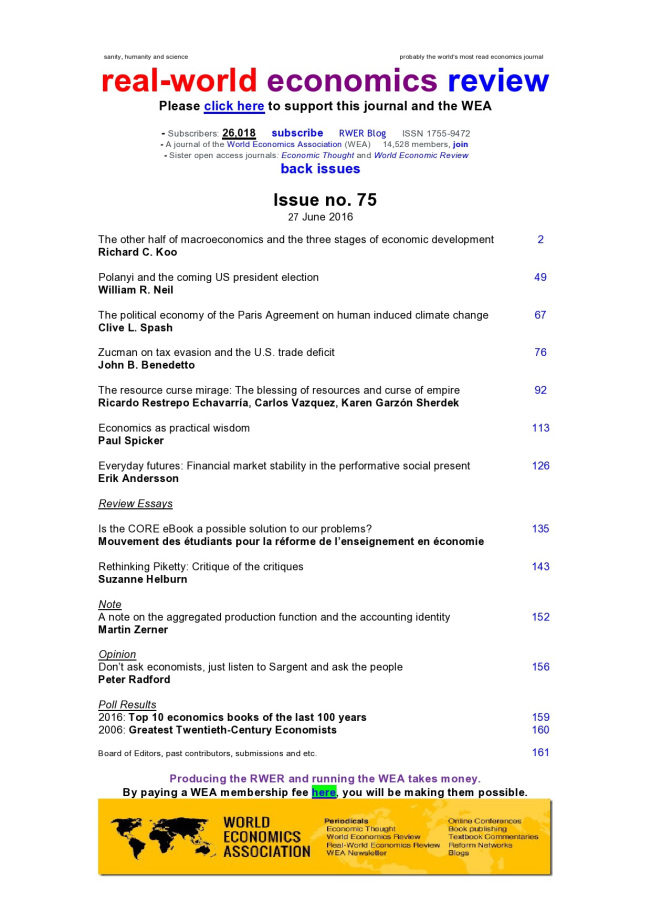Much of social science has come to rely on a set of analytical approaches intended to identify specific influences within a range of confounding factors. The object of analysis is to separate the strands, to distinguish different influences, to attribute influence to particular variables. This has to be done in the face of multiple, competing influences. As a discipline, economics goes about this in different ways. The traditional approach of classical economics is theoretical and deductive. Economic reasoning typically depends on theorisation about patterns of behaviour, subject to the assumption that ‘other things are equal’. A range of models have been developed as a potential guide to analysis. Once the initial outline of a model has been determined, it is then possible successively to test the assumptions to see what the implications are of each further variable. This is the approach of much of what is done in microeconomic theory, including models of the actions of rational consumers or the behaviour of producers. Friedman argued that the test of theory was instrumental: “Viewed as a body of substantive hypotheses, theory is to be judged by its predictive power for the class of phenomena which it is intended to ‘explain’….
Topics:
Editor considers the following as important: Uncategorized
This could be interesting, too:
tom writes The Ukraine war and Europe’s deepening march of folly
Stavros Mavroudeas writes CfP of Marxist Macroeconomic Modelling workgroup – 18th WAPE Forum, Istanbul August 6-8, 2025
Lars Pålsson Syll writes The pretence-of-knowledge syndrome
Dean Baker writes Crypto and Donald Trump’s strategic baseball card reserve
Much of social science has come to rely on a set of analytical approaches intended to identify specific influences within a range of confounding factors. The object of analysis is to separate the strands, to distinguish different influences, to attribute influence to particular variables. This has to be done in the face of multiple, competing influences.
As a discipline, economics goes about this in different ways. The traditional approach of classical economics is theoretical and deductive. Economic reasoning typically depends on theorisation about patterns of behaviour, subject to the assumption that ‘other things are equal’. A range of models have been developed as a potential guide to analysis. Once the initial outline of a model has been determined, it is then possible successively to test the assumptions to see what the implications are of each further variable. This is the approach of much of what is done in microeconomic theory, including models of the actions of rational consumers or the behaviour of producers. Friedman argued that the test of theory was instrumental:
“Viewed as a body of substantive hypotheses, theory is to be judged by its predictive power for the class of phenomena which it is intended to ‘explain’…. To be important… a hypothesis must be descriptively false in its assumptions… the relevant question to ask about the ‘assumptions’ of a theory is not whether they are descriptively ‘realistic’, for they never are, but whether they are sufficiently good approximations for the purpose in hand” (Friedman, 1953, pp. 8, 14).
A second approach is empirical and deductive. Hausman refers to it as ‘positivist’ or ‘Popperian’ (Hausman, 1989); there are differences between those categories, but they share roots in empiricism rather than a primary dependence on theoretical reasoning. Explanations for behaviour are progressively refined through a process of conjecture and empirical refutation. This is the route that has been followed in the new ‘behavioural economics’, a fusion of psychology and economics. Psychology uses empirical situations, often controlled through experimental formats, to define and test the influence of specific constructs on behaviour. So, for example, the behaviour of a consumer faced with choices of what to purchase can be empirically constructed and examined (e.g. Sippel, 1997; Ariely, 2008). The shift to behavioural economics is viewed by many as a release from the limitations of traditional theorisation – and possibly exoneration from the charge that economic theory is too remote from empirical evidence to be scientific. (Syll is sceptical that there has been genuine movement. Many of the experimental conditions are still remote from real situations: Syll, 2016, pp. 148-152.)
The third approach is empirical and inductive. Econometrics typically proceeds by modelling the behaviour of an economy. This can be done through a deductive method, but more typically modelling is done by identifying patterns and trends inductively – using the data to construct descriptive equations. The process is designed to consider both the contribution of specific variables and their interactions.
Those who want economics to be more like the natural sciences sometimes argue that the weakness of economics rests in its over-reliance on theoretical deduction, and an insufficient emphasis on the empirical elements (Joffe, 2011). Criticisms of the methodology of economics have tended to focus on the limitations of economic models (e.g. Marques, 2015), the extent to which theoretical models can be used to explain empirical phenomena (Syll, 2016) , or the need to strengthen the subject’s empirical basis (Blaug, 1992). In other fields of social science, however – including sociology, political science and social policy – the basic principles behind all of these approaches have been challenged (Flyvbjerg, 2001; Laitin, 2003; Schram, 2003; Spicker, 2011). It is open to question whether social science can ever legitimately be based on idealised, causal or generative explanations. The influence of individual variables cannot confidently be isolated from the context in which the variables operate. Even if the limitations are overcome, it is not clear that it is possible to develop prescriptions for policy on this basis.

